The Sports Bicycles Market is estimated to be valued at USD 15.6 billion in 2025 and is projected to reach USD 32.2 billion by 2035, registering a compound annual growth rate (CAGR) of 7.5% over the forecast period. A growth momentum analysis shows steady growth, with initial acceleration followed by stable, sustained expansion. Between 2025 and 2030, the market grows from USD 15.6 billion to USD 22.4 billion, contributing USD 6.8 billion in growth, with a CAGR of 8.6%. This early-phase growth is driven by the rising popularity of outdoor sports, fitness, and recreational cycling, particularly in developed regions. Increased awareness of health benefits and environmentally friendly transportation further supports market demand. The growing adoption of sports bicycles for commuting, along with a shift toward high-performance models and technological innovations (e.g., e-bikes), fuels this phase of growth.
From 2030 to 2035, the market expands from USD 22.4 billion to USD 32.2 billion, adding USD 9.8 billion in growth, with a slightly lower CAGR of 6.7%. This deceleration reflects the market maturing in developed countries, where demand stabilizes. However, growth remains robust due to rising adoption in emerging markets, supported by increased disposable incomes, urbanization, and a growing focus on sustainability and fitness. The analysis indicates a strong early-phase acceleration followed by steady growth as the sports bicycles market continues to expand across various demographics and regions.
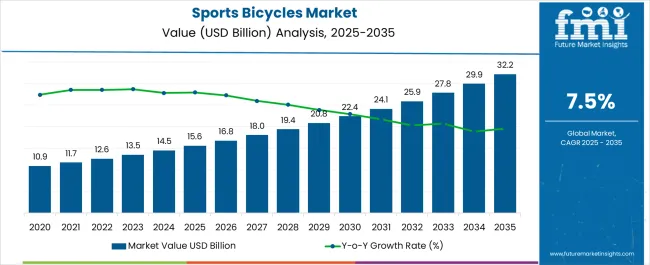
| Metric | Value |
|---|---|
| Sports Bicycles Market Estimated Value in (2025 E) | USD 15.6 billion |
| Sports Bicycles Market Forecast Value in (2035 F) | USD 32.2 billion |
| Forecast CAGR (2025 to 2035) | 7.5% |
The sports bicycles market is gaining strong momentum due to increased consumer interest in fitness activities, eco-friendly transportation, and performance-driven outdoor recreation. Technological advancements in electric assist systems, lightweight frame materials, and smart connectivity features have broadened the appeal of sports bicycles among both amateur and professional riders.
Urban mobility trends and environmental concerns are prompting users to shift away from motorized vehicles, with sports bicycles serving as both lifestyle and practical alternatives. In addition, increased investment in cycling infrastructure, sporting events, and health awareness campaigns is fostering market growth across regions.
The outlook for the market remains robust as innovation continues to drive product differentiation, and consumers prioritize health, convenience, and environmental consciousness in their purchasing decisions.
The sports bicycles market is segmented by technology, product, end-user, sales channel, and geographic regions. By technology, the sports bicycles market is divided into Electric and Traditional. In terms of product, the sports bicycles market is classified into Mountain bicycles, Cyclo-cross bicycles, Road racing bicycles, and Track racing bicycles. Based on end-user, the sports bicycles market is segmented into Men, Women, and Kids.
By sales channel, the sports bicycles market is segmented into Online and Offline. Regionally, the sports bicycles industry is classified into North America, Latin America, Western Europe, Eastern Europe, Balkan & Baltic Countries, Russia & Belarus, Central Asia, East Asia, South Asia & Pacific, and the Middle East & Africa.
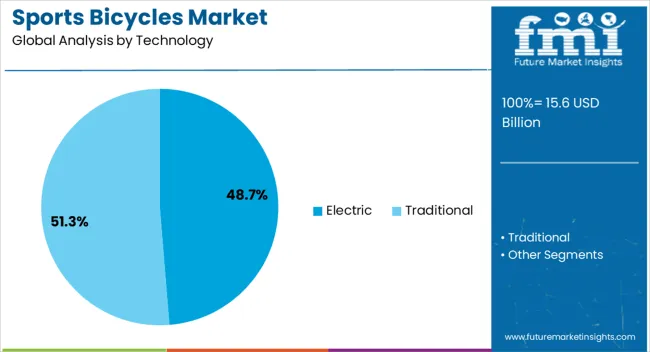
The electric segment is expected to contribute 48.70% of total market revenue by 2025 within the technology category, making it the leading segment. The rising popularity of electric assist fuels this growth, featuring products that provide enhanced mobility, especially over long distances or challenging terrains.
Consumers are increasingly valuing electric sports bicycles for their ability to combine fitness benefits with commuting convenience. The integration of powerful battery systems, regenerative braking, and lightweight motor components has made electric variants more accessible and user-friendly.
As urban commuting and recreational cycling converge, electric sports bicycles are being adopted across various demographics, securing their dominance in the technology segment.
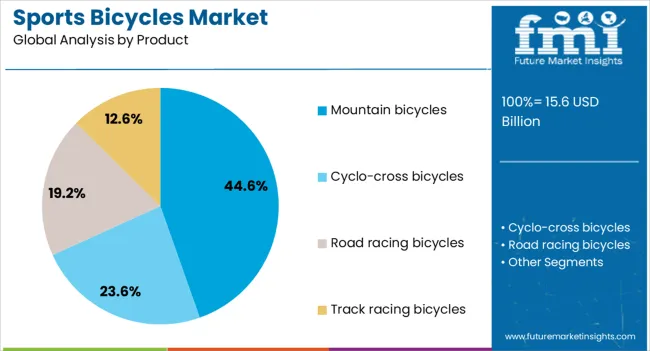
The mountain bicycles segment is projected to account for 44.60% of market revenue by 2025 within the product category, emerging as the leading product type. This is driven by consumer preference for versatility, durability, and off-road capability.
Mountain bicycles are well-suited for both rugged terrain and urban trails, making them a popular choice among enthusiasts and casual riders alike. Manufacturers have continued to innovate with suspension systems, gear configurations, and frame geometry to enhance performance and comfort.
Their adaptability for both sport and recreation purposes has reinforced their position as a staple in the sports bicycle market, supporting their leading share.
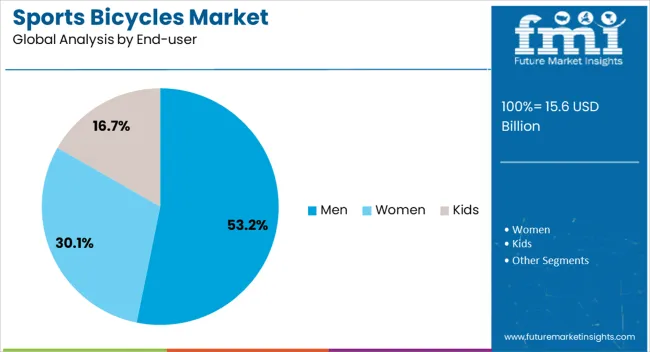
The men segment is anticipated to hold 53.20% of the market by 2025 within the end user category, positioning it as the dominant demographic group. This is attributed to a higher participation rate in sports and adventure cycling activities among men, coupled with greater spending on performance bicycles and accessories.
Marketing campaigns, brand endorsements, and product designs often target this segment with performance-oriented features and aggressive styling. Additionally, the availability of a wide range of men's specific models and sizing has contributed to increased adoption.
As cycling culture continues to grow in urban and fitness-focused communities, men remain the primary end-user segment driving sales across premium and mid-range bicycle categories.
The sports bicycles market is growing due to the increasing popularity of cycling as a recreational activity and a sustainable mode of transport. The rising awareness of health benefits, environmental concerns, and the growing adoption of cycling in urban areas are driving the demand for sports bicycles. Innovations in bicycle design, lightweight materials, and improved performance features are contributing to market expansion. Despite challenges such as high pricing for premium models and the need for widespread cycling infrastructure, the market continues to benefit from a growing trend towards fitness and eco-friendly transport solutions.
The primary driver for the growth of the sports bicycles market is the increasing popularity of cycling for fitness, recreation, and sport. As more people turn to cycling as a fun and effective way to stay active, the demand for sports bicycles is rising across various demographics. Cycling is increasingly seen as a low-impact exercise with numerous health benefits, such as improved cardiovascular health and muscle strength. Furthermore, cycling is being promoted as an eco-friendly mode of transportation, especially in urban areas, which is driving the adoption of sports bicycles. The growing awareness of environmental issues and the benefits of cycling for sustainable commuting further contribute to the market's expansion.
Despite its growth, the sports bicycles market faces several challenges. One of the main hurdles is the high cost of high-performance bicycles, which can limit access to premium models for certain consumer groups. Sports bicycles, especially those made from lightweight materials like carbon fiber, can be expensive, making it difficult for price-sensitive customers to invest in them. The market faces competition from other fitness and outdoor sports, such as running, hiking, and swimming, which may draw potential customers away from cycling. Overcoming the cost barrier while maintaining product quality and performance will be key to further market penetration.
The sports bicycles market offers significant growth opportunities due to advancements in bicycle technology and the expanding cycling infrastructure in urban areas. Innovations in materials such as carbon fiber, aluminum alloys, and advanced suspension systems are making sports bicycles lighter, more durable, and better suited for a variety of terrains. As cities develop more bike lanes and cycling-friendly infrastructure, there is increased accessibility and safety for cyclists, which is encouraging more people to take up cycling. The rise of e-bikes, which offer motor-assisted pedaling, also presents new growth opportunities, particularly for those looking for an easier cycling experience in hilly terrains or longer distances.
A key trend in the sports bicycles market is the growing popularity of e-bikes, which combine traditional cycling with electric power to assist with pedaling. E-bikes are gaining traction among a wide range of cyclists, from casual riders to those who require extra assistance on longer rides or hilly terrains. In addition, there is increasing interest in integrating smart technology into bicycles. Features such as GPS tracking, fitness monitoring, and Bluetooth connectivity for music or navigation are becoming common in modern sports bicycles. These innovations are enhancing the overall cycling experience, attracting more consumers to the market and providing new growth avenues. As technology continues to advance, the demand for high-tech, performance-oriented bicycles is expected to continue rising.

The sports bicycles market is expected to grow at a global CAGR of 7.5% from 2025 to 2035, driven by increasing interest in outdoor recreational activities and fitness. China leads the market with a growth rate of 10.1%, followed by India at 9.4%, and Germany at 8.6%. The UK is expected to grow at 7.1%, while the USA shows a growth rate of 6.4%. The expanding fitness culture, growing urban cycling infrastructure, and increasing health consciousness in emerging markets like China and India are key drivers. Developed countries like the UK and the USA continue to experience steady growth, with a focus on environmentally friendly transportation and wellness. The analysis covers over 40 countries, with the leading markets shown below.
China is expected to grow at a CAGR of 10.1% through 2035, driven by the rising demand for sports and recreational cycling. Urbanization and increased health consciousness are key factors behind this growth, as consumers seek healthier lifestyles and eco-friendly transport options. Government initiatives supporting green mobility further contribute to the market's expansion. As China’s middle class continues to grow, the demand for higher-end bicycles is also increasing, especially in urban areas. China is projected to dominate the market, thanks to its vast consumer base and the increasing popularity of cycling as a recreational activity.
India is projected to grow at a CAGR of 9.4% through 2035, as more consumers opt for sports bicycles for both fitness and transportation purposes. The growing middle class, increasing urbanization, and government initiatives promoting cycling are all contributing factors to the market's expansion. In addition, India’s rising youth population and increasing focus on fitness and wellness are boosting demand. The growing availability of sports bicycles through online and offline retail channels is also driving the market forward, making them more accessible to a larger portion of the population.
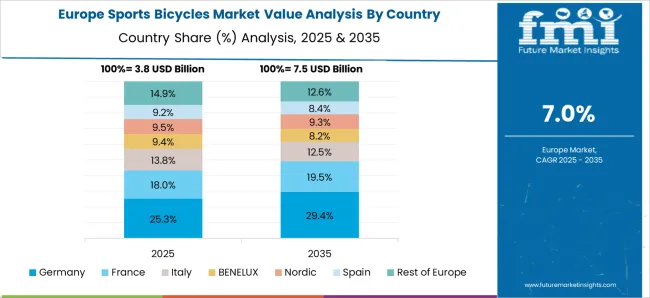
Germany is expected to grow at a CAGR of 8.6% through 2035, as cycling continues to gain popularity in the country. The German government’s strong focus on sustainability and green transportation is a major factor driving the market. With a well-established cycling infrastructure, Germany is seeing an increase in the adoption of sports bicycles, both for recreational purposes and competitive cycling. The rise in cycling events and sports activities, combined with a high standard of living, is encouraging people to invest in sports bicycles. Germany’s established market is anticipated to see steady growth, supported by increasing demand for premium bicycles and technological advancements in the sector.
The UK is expected to grow at a CAGR of 7.1% through 2035, with a growing demand for sports bicycles driven by increasing interest in outdoor sports and fitness activities. The government’s commitment to promoting cycling as a means of transportation has also fueled market growth. The increasing awareness of environmental concerns and the benefits of cycling as an eco-friendly mode of transport are encouraging more people to invest in bicycles. The UK market is driven by both recreational and competitive cycling, with strong demand for high-quality and technologically advanced bicycles.
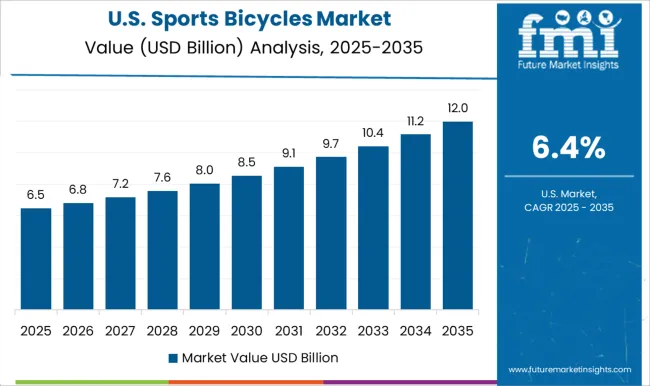
The USA is projected to grow at a CAGR of 6.4% through 2035, driven by rising participation in fitness activities and outdoor sports. The USA market benefits from an increasing focus on health and wellness, with many individuals turning to cycling for exercise and transportation. The rise of cycling events and the growing availability of cycling infrastructure in major cities is also contributing to market growth. The increasing availability of sports bicycles in various price ranges and the growing popularity of eco-friendly transportation options are expected to drive continued demand in the USA

Bianchi is recognized for premium road platforms and distinctive design language that serve professionals and enthusiasts. Cannondale Bicycle Corporation is known for lightweight frames and suspension expertise across road and mountain categories. CUBE Bikes provides a wide portfolio for varied skill levels with attention to fit, handling, and value. Giant Manufacturing Co., Ltd. ranks among the largest producers globally, with road, mountain, and electric bicycles that balance performance and affordability.
GT Bicycles specializes in mountain and BMX, emphasizing durable constructions. Merida Industry Co., Ltd. offers versatile road, mountain, and hybrid lines with precision engineering. Scott Sports SA is associated with composite know-how and integrated systems across road and off-road ranges. Specialized Bicycle Components, Inc. is recognized for performance-focused platforms and ecosystem components that elevate ride quality. Trek Bicycle Corporation delivers comprehensive coverage of disciplines and supports buyers through strong dealer service networks.
| Item | Value |
|---|---|
| Quantitative Units | USD 15.6 Billion |
| Technology | Electric and Traditional |
| Product | Mountain bicycles, Cyclo-cross bicycles, Road racing bicycles, and Track racing bicycles |
| End-user | Men, Women, and Kids |
| Sales Channel | Online and Offline |
| Regions Covered | North America, Europe, Asia-Pacific, Latin America, Middle East & Africa |
| Country Covered | United States, Canada, Germany, France, United Kingdom, China, Japan, India, Brazil, South Africa |
| Key Companies Profiled | Bianchi, Cannondale Bicycle Corporation, Cube Bikes, Giant Manufacturing Co., Ltd., GT Bicycles, Jenson USA, Merida Industry Co., Ltd., Scott Sports SA, Specialized Bicycle Components, Inc, and Trek Bicycle Corporation |
| Additional Attributes | Dollar sales by product type (road bicycles, mountain bicycles, hybrid bicycles, electric bicycles) and end-use segments (competitive cycling, recreational cycling, triathlons, commuting). Demand dynamics are driven by the increasing popularity of outdoor sports, advancements in bicycle technology, and the growing trend towards fitness and eco-friendly transportation. Regional trends show strong growth in North America, Europe, and Asia-Pacific, with North America leading in road cycling and Europe in mountain biking. Innovations in lightweight materials, aerodynamic designs, and electric bike integration are key market drivers, while sustainability trends are influencing eco-conscious consumer choices. |
The global sports bicycles market is estimated to be valued at USD 15.6 billion in 2025.
The market size for the sports bicycles market is projected to reach USD 32.2 billion by 2035.
The sports bicycles market is expected to grow at a 7.5% CAGR between 2025 and 2035.
The key product types in sports bicycles market are electric, _mountain bicycles, _cyclo-cross bicycles, _road racing bicycles, _track racing bicycles, traditional, _mountain bicycles, _cyclo-cross bicycles, _road racing bicycles and _track racing bicycles.
In terms of product, mountain bicycles segment to command 44.6% share in the sports bicycles market in 2025.






Full Research Suite comprises of:
Market outlook & trends analysis
Interviews & case studies
Strategic recommendations
Vendor profiles & capabilities analysis
5-year forecasts
8 regions and 60+ country-level data splits
Market segment data splits
12 months of continuous data updates
DELIVERED AS:
PDF EXCEL ONLINE
Sports Betting Market Size and Share Forecast Outlook 2025 to 2035
Sports Wearables Market Size and Share Forecast Outlook 2025 to 2035
Sports Protective Equipment Market Size and Share Forecast Outlook 2025 to 2035
Sports Sunglasses Market Size and Share Forecast Outlook 2025 to 2035
Sports Turf Seed Market Size and Share Forecast Outlook 2025 to 2035
Sports Nutrition Ingredients Market Size and Share Forecast Outlook 2025 to 2035
Sports Food Market Size and Share Forecast Outlook 2025 to 2035
Sports Drink Industry Analysis in USA - Size and Share Forecast Outlook 2025 to 2035
Sports Officiating Technologies Market Size and Share Forecast Outlook 2025 to 2035
Sports Drug Testing Market Size and Share Forecast Outlook 2025 to 2035
Sports Streaming Platform Market Size and Share Forecast Outlook 2025 to 2035
Sports Drink Market Analysis - Size, Share, and Forecast Outlook 2025 to 2035
The Sports Medicine Market Is Segmented by Product, Application and End User from 2025 To 2035
Sports Nutrition Market Brief Outlook of Growth Drivers Impacting Consumption
Sports Analytics Market Growth - Trends & Forecast 2025 to 2035
Sports Nutrition Market Share Analysis – Trends, Growth & Forecast 2025-2035
Sports Inspired Clothing Market Analysis – Trends, Growth & Forecast 2025-2035
Sports and Leisure Equipment Retailing Industry Analysis by Product Type, by Consumer Demographics, by Retail Channel, by Price Range, and by Region - Forecast for 2025 to 2035
Sports and Athletic Insoles Market Analysis - Size, Share, and Forecast 2025 to 2035
A Detailed Global Analysis of Brand Share for Sports and Athletic Insoles Market

Thank you!
You will receive an email from our Business Development Manager. Please be sure to check your SPAM/JUNK folder too.
Chat With
MaRIA